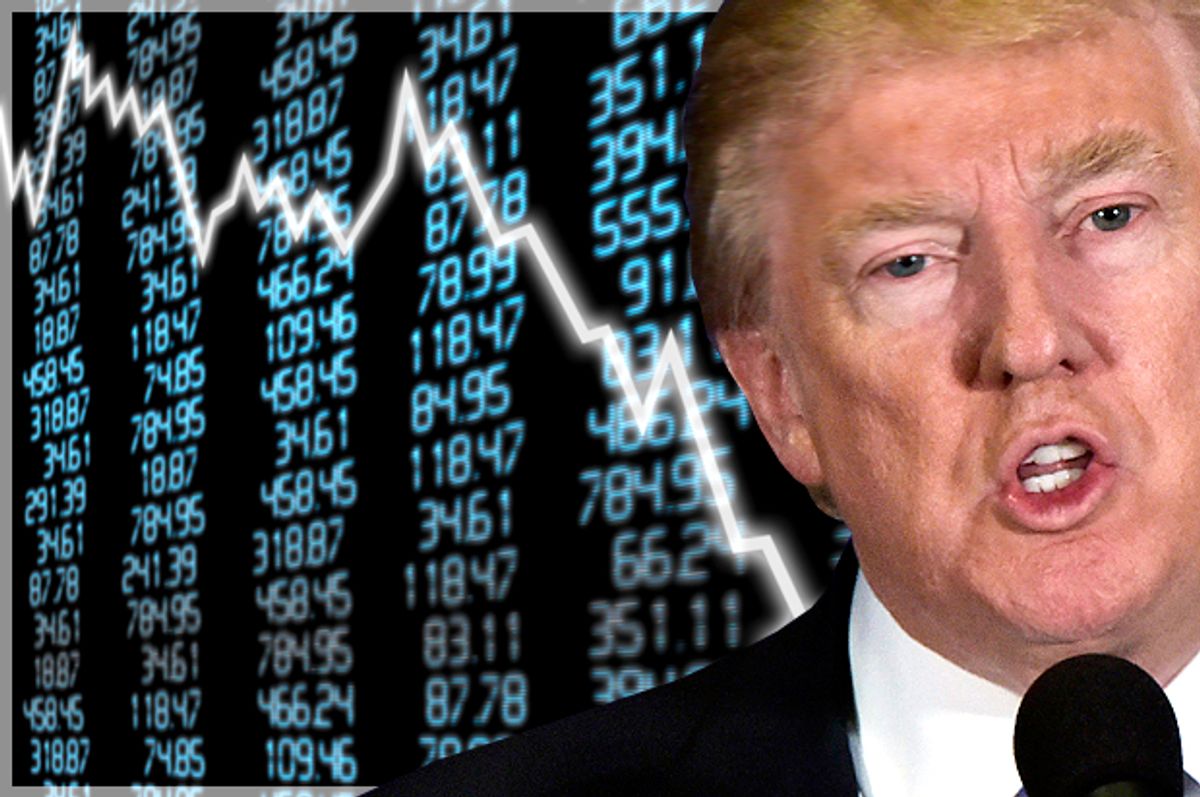Americans went to bed late on Tuesday or early Wednesday pondering the results of the U.S. elections that will elevate a billionaire real estate developer and reality TV star to the post of president of the United States. But as the country bedded down from an exhausting and divisive presidential race, the 24/7 global financial system fell into a panic as traders from Hong Kong to New York reacted in a knee-jerk fashion to the mercurial Donald Trump's stunning victory over Hillary Clinton.
A barrage of volatile swings in stocks, bonds, currencies and commodities began late on Tuesday as key battleground state Florida appeared poised to go for Trump. And by Wednesday’s closing bell in New York, the storm had largely passed. The benchmark S&P 500 index ended Wednesday at its highest level in almost a month, defying expectations.
The surprise postelection rebound was the second rally of the week. The first came on Monday when traders expected Democrat Hillary Clinton to cruise to victory after the FBI on Sunday announced that the recently discovered emails linked to Clinton’s private server controversy would not change the agency's determination that there would be no charges filed.
Then just as quickly, Wall Street reversed course as election results began tilting in Trumps’ favor — S&P 500 futures (an overnight market that bets on how the index will open that morning) fell by as much as 5 percent, activating a market circuit breaker aimed at curbing panic selling. By Wednesday afternoon both the S&P 500 and Dow Jones Industrial Average ended the day between 1 percent and 2 percent above their opening levels, and the Dow gained nearly 260 points a robust performance on a typical day much less that day after a stunning upset to a U.S. presidential election. A similar pattern played out in major European indexes after the election results came in, with late-day rebounds from heavy losses earlier. Markets in Asia, especially Japan’s Nikkei 225, were down because they closed before traders could react to the rebound in stock futures. (The Nikkei was also impacted by currency traders piling into the yen in the wake of the election – a stronger yen tends to push the index lower.)
So are the markets panicked or placid? The answer is yes – both. And if this all these vertiginous swings sound crazy — a market rally on Monday followed by an overnight rout on Tuesday followed by another rally on Wednesday — get used to it; bipolar-like behavior could be the new normal. For the coming days and weeks investors will be playing a guessing game as to what it means to have President-elect Trump and a Republican-controlled Congress. Volatility is the name of the game, and each appointment, speech and appearance could spark a sell-off or a rally.
The currency markets are a somewhat different story. The biggest loser in the election so far has been the Mexican peso. Trump’s promise to renegotiate the North American Free Trade agreement, build a wall between the U.S. and its southern neighbor and penalize U.S. companies that set up factories in Mexico sent the peso to a record low against the U.S. dollar. At one point in the wee hours of Wednesday morning, the peso was down 12.5 percent, trading at more than 20.50 pesos to the dollar. A day earlier, the peso had been trading at below 18.50 pesos against the greenback amid optimism that Clinton would win the election. Even after Wednesday's rally, the peso was still trading at around 19.80.
While gaining against the Mexican peso, the U.S. dollar has been beaten down by other currencies, especially the euro, Swiss franc and Japanese yen. The reasons boil down to politics. Trump’s protectionist rhetoric and threats of retaliatory import tariffs and withdrawal from the World Trade Organization could lead to higher U.S. inflation and a weaker U.S. dollar.
Gold prices spiked overnight, too, as some investors (including governments) raced to buy up the precious metal. Prices rose nearly 5 percent early on Wednesday, to about $1,337 per troy ounce, representing its biggest bounce since the Britain referendum decision in June to leave the European Union. But by Wednesday evening the metal had settled down to $1,278 on the London Metal Exchange.
There are already some hints about how the new administration will impact certain sectors.
The president-elect’s promise to “cancel” the Paris climate accord to lower greenhouse emissions and to spur further oil and gas development will give a boost to oil and gas companies, which have been hammered by a protracted global oil glut. Likewise, Trump’s antagonistic remarks about renewable energy won’t bode well for companies in that sector if his aggressive views translate into policy decisions, like cutting Department of Energy and other federal incentives.
Trump’s pledge to repeal the Affordable Care Act would most definitely adversely affect health insurers that have reaped a bounty under President Barack Obama’s signature health care legislation. Aerospace companies are expected to benefit from Trump's pledges to boost spending on new warships and fighter jets.
Big Pharma could fare better under Trump, as well. Though he has spoken out against excessive drug pricing, his views have been less forceful than Clinton’s. U.S. automotive manufacturers stand to lose if Trump follows through on promises to economically punish them for opening factories in Mexico.
There are many unknowns right now as a true outsider is preparing to occupy the Oval Office. And because markets abhor uncertainty, expect the sudden bouts of volatility to continue for weeks if not months to come. For the typical investor with a 401(k) this advice stands: Wait for things to settle before making any major decisions about what to do with your investments. And don’t let emotions overtake your common sense.



Shares